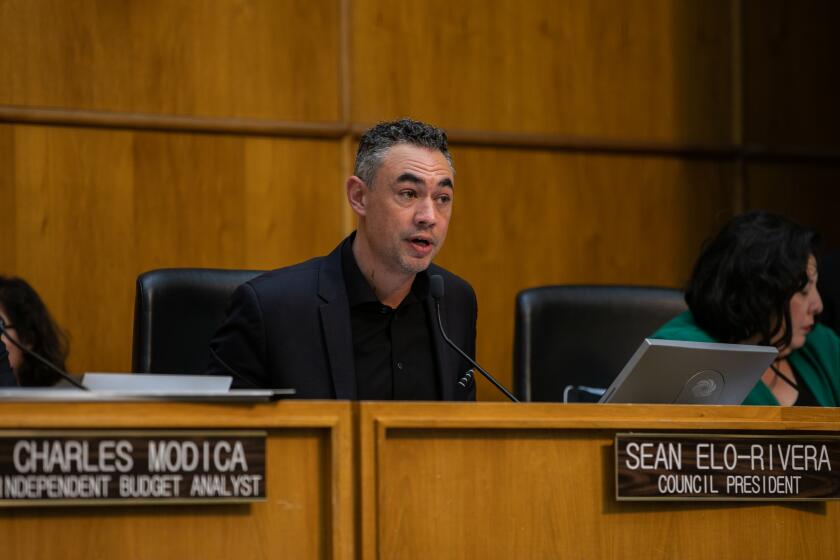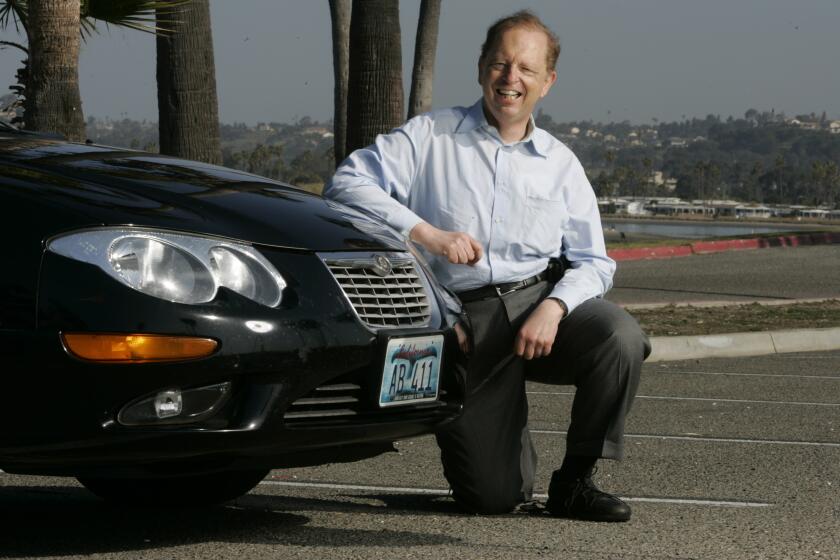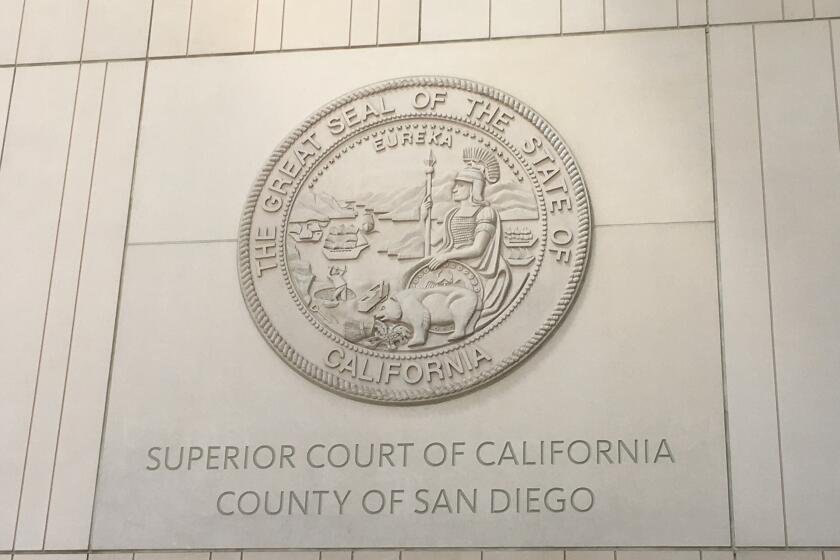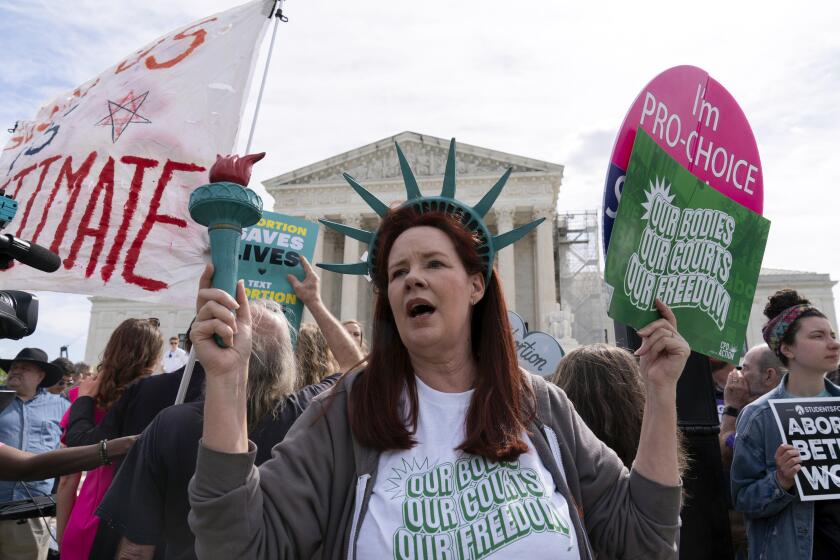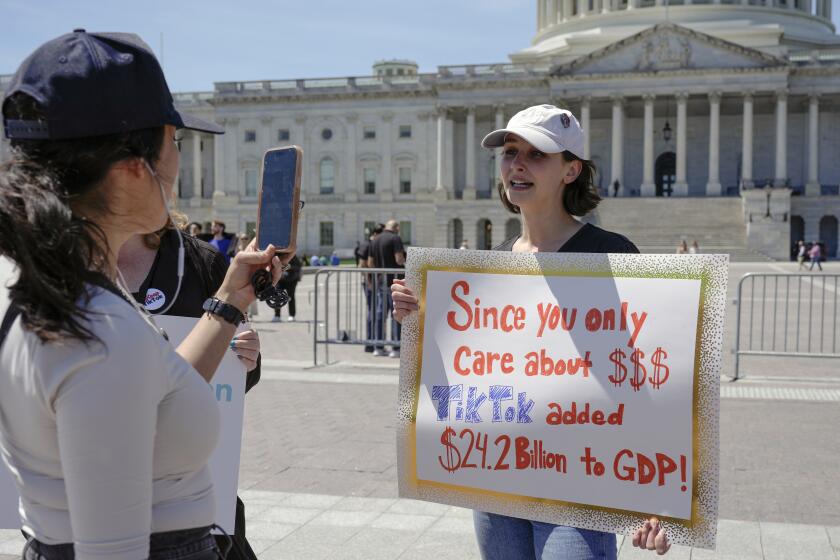Homeless people living in RVs still getting tickets despite federal injunction limiting San Diego’s enforcement options
Homeless people living in recreational vehicles are still being ticketed in San Diego despite a federal injunction blocking one kind of enforcement, prompting advocacy groups to launch a program that helps fight the tickets with sophisticated appeals.
San Diego police have obeyed the federal judge’s order to stop issuing tickets under the city’s vehicle habitation law, but the police have continued issuing tickets under the city’s oversized vehicle law.
That law, enacted in 2014, prohibits recreational vehicles from parking on any San Diego city street or in any public parking lot between 2 a.m. and 6 a.m., making it essentially impossible to live in an RV -- despite the injunction.
So Disability Rights California and Think Dignity began hosting clinics last week at which they teach homeless people living in RVs how to legally appeal the tickets, request administrative hearings and mount a “necessity” defense.
Even if the appeals end up failing, the advocacy groups say they will have achieved the goal of making it harder for the city to force homeless people, especially disabled homeless people, out of their RVs and onto the streets.
The effort comes as Disability Rights California and city officials continue to discuss a potential settlement of the lawsuit that led to the August injunction issued by U.S. District Judge Anthony Battaglia.
Those discussions have focused on changes in enforcement that would allow homeless people to park their recreational vehicles somewhere legally. Options include issuing special permits or creating a special parking lot.
The lawsuit, filed last year, contended that both laws were unconstitutional. It was a class action suit filed on behalf of nine disabled homeless people.
Battaglia agreed that the vehicle habitation law was too vague to enforce, but said the oversized vehicle law was legally sound.
Disability Rights California argued that the oversized vehicle law is state-created danger, contending it endangers people’s lives by forcing them onto the streets once they get five tickets, the number that prompts vehicle impoundment.
Attorneys for the city argued both laws are neutral and can’t be challenged under disability discrimination laws because they apply to everyone regardless of disability status.
Special parking lots established last year in San Diego allow overnight parking for homeless individuals, but they don’t accept RVs and have far fewer spaces than the estimated 1,000 homeless people living in vehicles locally.
Disability Rights California says physically disabled people may struggle with stairs in some shelters, and that those with mental health problems don’t function well in noisy, dirty, unsafe and overcrowded conditions.
“A lot of the facilities in San Diego for the homeless population don’t have the ability to really effectively make sure these folks get the medical attention that they need,” Mitchelle Woodson, a staff attorney for nonprofit Think Dignity, said last week at one of the clinics focused on fighting the parking tickets.
“Pushing them out onto the street can only exacerbate medical conditions,” she said. “You’re putting them out in the elements where they are more vulnerable.”
The homeless people at the clinic, which was held at the Pacific Beach library branch, said they don’t understand why the city won’t let them park their recreational vehicles overnight in large parking lots near Mission Bay.
“I can understand people not wanting RVs parked in their residential area,” said Teresa Lunsford, who’s been living in her RV since May. “But when you are parked far away like near the bay, nobody is around there from 2 to 6 in the morning. We’re trying to stay out of people’s way and be able to park our RVs.”
Charles Fink said the overnight vehicle law is also confusing. Signs in Mission Bay Park say no parking there between 2 and 4 a.m., but the oversized vehicle law applies from 2 to 6 a.m.
“They don’t tell you which ones supersedes the other,” he said. “You would think it would be the posted sign.”
Max Sperry says the oversized vehicle law, which also applies to trucks and boats that are unusually long, is being selectively enforced. Long trucks get ignored but the police always ticket RVs, he said.
The clinics explain step-by-step how to fight tickets under the law, starting with requesting an administrative review online or in person.
If that is denied, which is typical, the next step is requesting an administrative hearing, which requires paying the $112.50 ticket.
If that is unsuccessful, the next step is to appeal to the state Superior Court.
The clinics also focus on two potential legal strategies: claiming exemption from the law because of disability or using a necessity defense, under which the homeless can argue they have no other reliable shelter and can’t afford any other options.
The sample briefs provided contend that sleep is a necessity of life and that homeless people don’t have the gas money to drive around for four hours each night while the oversized vehicle law is in effect.
A spokesman for City Attorney Mara Elliott declined to comment.
david.garrick@sduniontribune.com (619) 269-8906 Twitter:@UTDavidGarrick
Get Essential San Diego, weekday mornings
Get top headlines from the Union-Tribune in your inbox weekday mornings, including top news, local, sports, business, entertainment and opinion.
You may occasionally receive promotional content from the San Diego Union-Tribune.




